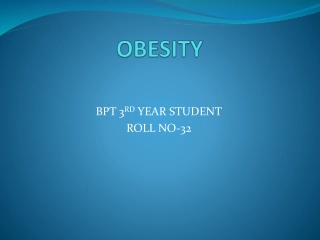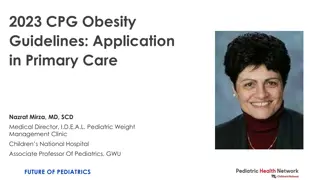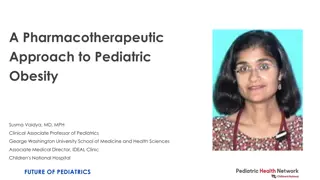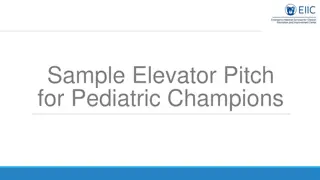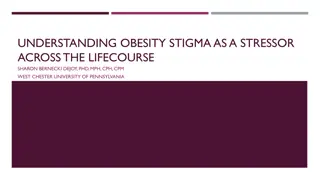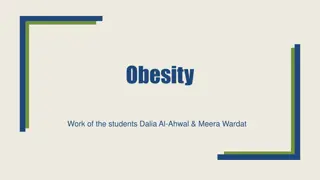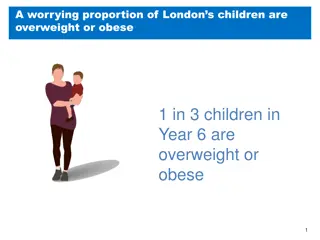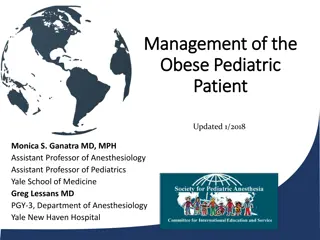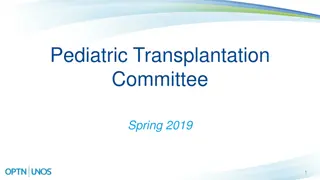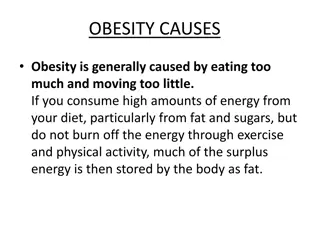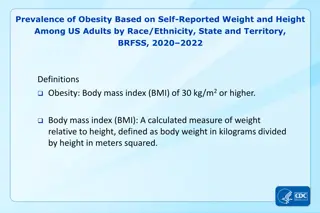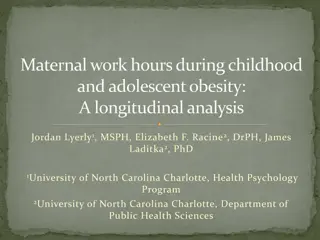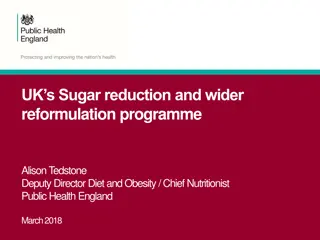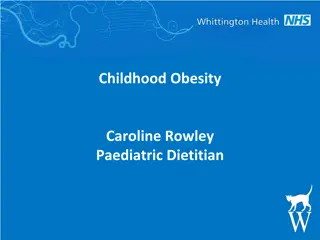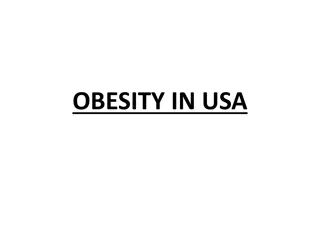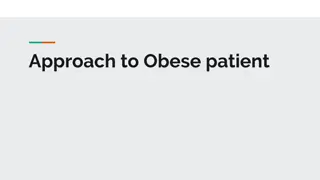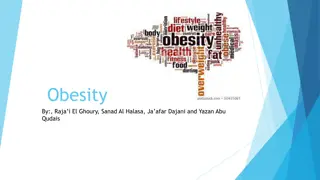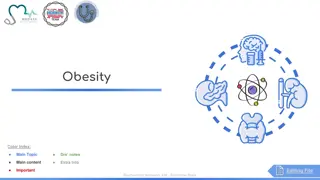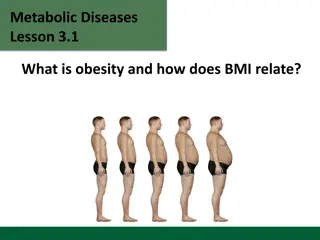Obesity
Obesity, its causes, and how it affects overall health. Discover the role of factors such as genetics, lifestyle, and eating habits. Explore the prevalence of obesity worldwide and its correlation with various diseases. Understand the measurement of obesity through BMI and its different categories.
2 views • 19 slides
Pediatric Workforce Initiative 2025 Presentation Highlights
Explore the key points of the Pediatrics 2025 AMSPDC Workforce Initiative, emphasizing the importance of investing in pediatric health care, the role of pediatric subspecialists, and the need for improved access to specialized care for children and adolescents. The presentation covers reasons to pri
2 views • 28 slides
Distribution of Direct Healthcare Costs and Obesity-Related Complications Among High-Cost Individuals Living with Obesity
This UK retrospective cohort study examines the demographic and clinical characteristics of individuals living with obesity who contribute most to direct healthcare costs. The study uses data from the UK Discover database to stratify individuals with obesity into quintiles and assess their contribut
2 views • 12 slides
2023 CPG Obesity Guidelines: Application in Primary Care and Impact on Pediatric Health
Application of the 2023 CPG Obesity Guidelines in primary care is crucial due to the increased prevalence of obesity among children, with 19% affected in the US. This guideline update is necessary as the last guidelines were published in 2007 and there is now more data available, including RCTs and
5 views • 23 slides
Pediatric Trauma Resources: Chest, Abdomen, and Pelvis Review
This guideline provides resources for the evaluation and management of chest, abdomen, and pelvic trauma in pediatric patients. It covers a range of topics including thoracic injuries, abdominal trauma evaluation, nonoperative management protocols, and guidelines for various pediatric injuries. The
5 views • 21 slides
Trusted Partner in Pediatric Wellness is Our QuickMD Care - Google Docs
Quickmdcare-Pediatrician Doctors provides a wide range of Pediatric services in Pediatric hospital at Frisco, Mckinney, Texas. Pediatric Doctors Clinic.
6 views • 1 slides
A Pharmacotherapeutic Approach to Pediatric Obesity
Explore pediatric pharmacotherapeutic options for managing obesity, including off-label medication use. Review guidelines, recommendations, and the role of medication in adjunct to lifestyle interventions for children and adolescents with obesity.
4 views • 31 slides
Understanding and Combating Obesity: Causes, Consequences, and Solutions
Obesity, characterized by abnormal weight gain, poses serious health risks such as heart diseases, high blood pressure, and joint problems. Genetic factors, lifestyle habits, and lack of physical activity contribute to obesity. Prevention involves maintaining a healthy diet, exercising regularly, an
0 views • 11 slides
Elevator Pitch for Pediatric Champions
Elevator speech helps in defining and communicating the value proposition of a project efficiently. In the context of developing a pediatric champion role, this pitch emphasizes the significance of having a dedicated staff member focused on pediatric readiness, highlighting the need for improved pra
0 views • 5 slides
Maternal and Fetal Complications of Obesity in Pregnancy
Understanding the impact of obesity stigma as a stressor throughout the lifecourse is essential, especially concerning pregnancy. The prevalence of pre-pregnancy overweight and obesity poses significant risks, leading to various maternal complications like gestational diabetes, cesarean delivery, an
0 views • 62 slides
Understanding Obesity: A Comprehensive Overview
Obesity is a complex health concern that goes beyond appearance. It increases the risk of various diseases like heart disease, diabetes, and cancer. Genetic factors, poor diet, sedentary lifestyle, and mental health issues can contribute to obesity. The consequences of obesity affect physical and me
0 views • 16 slides
Pediatric Obesity Management and Prevention Guidelines in Canada
This resource provides guidance on pediatric obesity management and prevention in Canada, based on the Canadian Clinical Practice Guidelines. It includes recommendations specific to the pediatric population, implementation strategies, and insights from content experts. The slides cover a range of to
1 views • 66 slides
Understanding Obesity: Causes, Impacts, and Solutions
Obesity is a medical condition involving excess body fat, leading to various health risks like heart disease, diabetes, and high blood pressure. Causes include poor diet, lack of exercise, genetic factors, and environmental influences. Impacts of obesity range from decreased quality of life to incre
4 views • 8 slides
Understanding Obesity: Causes, Consequences, and Prevention
Obesity is a treatable disease caused by genetic and environmental factors that can have serious health consequences like cardiovascular disease, diabetes, and certain cancers. Preventing obesity involves eating a healthy diet, exercising regularly, and practicing mindful eating habits. Awareness an
3 views • 9 slides
Addressing Childhood Obesity: A Call for Action in London
Childhood obesity in London is a significant concern, with 1 in 3 children in Year 6 being overweight or obese. This issue has far-reaching impacts on both children and society, including health problems and increased healthcare costs. Experts attribute the rising obesity rates to environmental and
2 views • 9 slides
Comprehensive Management of Pediatric Obesity: An Updated Approach
This presentation by Dr. Monica S. Ganatra and Dr. Greg Lessans provides an extensive overview of the management of obesity in pediatric patients. The content covers the definition of obesity, its systemic implications, pre-operative assessment, intra-operative management, and post-operative concern
0 views • 35 slides
Pioneering Pediatric Transplantation Initiatives
In the realm of pediatric transplantation, recent projects and upcoming bylaw implementations are focused on enhancing care transition, establishing key personnel requirements, and implementing vital components for kidney, liver, heart, lung, and pancreas transplants. The initiatives aim to improve
0 views • 9 slides
Analysis of Obesity Prevention Interventions in Harford County, Maryland
This capstone project by Dr. Katherine Richardson explores obesity prevention interventions in Harford County, Maryland. Despite historical public health efforts, obesity rates continue to rise, necessitating a closer look at community-based interventions. By analyzing peer counties with similar dem
1 views • 14 slides
Understanding Obesity: Causes and Factors Contributing to Weight Gain
Obesity is typically a result of consuming excess energy from a diet rich in fat and sugars while not expending that energy through physical activity. Factors like poor diet choices, lack of exercise, and genetic traits can contribute to the development of obesity over time. Environmental influences
0 views • 5 slides
Prevalence of Obesity Among US Adults by Race/Ethnicity, State, and Territory 2020-2022
The prevalence of obesity among US adults was studied based on self-reported weight and height by race/ethnicity, state, and territory using data collected through the Behavioral Risk Factor Surveillance System (BRFSS) in 2020-2022. The definition of obesity was a body mass index (BMI) of 30 kg/m2 o
0 views • 18 slides
Pediatric Palliative Care and the Role of Interlink Nurses in Northern Ontario
Vicky Wilton, a Pediatric Interlink Nurse in Northern Ontario, presented on pediatric palliative care focusing on identifying differences and similarities between pediatric and adult care, integrating advance care planning, and emphasizing hope. The role of Pediatric Interlink Nurses within the Pedi
0 views • 69 slides
Maternal Work Hours and Adolescent Obesity: A Longitudinal Analysis
This study investigates the relationship between increased maternal work hours during childhood and adolescent obesity. It explores how maternal employment and income levels may impact the rates of adolescent obesity, utilizing data from the Panel Survey of Income Dynamics and Child Development Surv
0 views • 12 slides
Obesity Challenge in Ghanaian Women: Levels, Consequences & Interventions
The study explores obesity levels in Ghanaian women, highlighting correlations with socio-demographic factors such as age, wealth index, education, and urban/rural residence. The research indicates high rates of obesity alongside childhood under-nutrition in lower-income settings. Proposed intervent
0 views • 24 slides
UK's Sugar Reduction and Childhood Obesity Programmes
Public Health England's Deputy Director of Diet and Obesity, Alison Tedstone, leads the UK's efforts to reduce sugar intake and combat childhood obesity. The prevalence of excess weight and tooth decay among children is highlighted, along with comparisons of UK diets with nutritional recommendations
0 views • 18 slides
Pediatric Obesity Intervention Strategies and Literature Review
This content discusses pediatric obesity intervention strategies, including motivational interviewing and lifestyle modification. It also reviews literature from PubMed regarding the topic from May 2011 to January 2017. The use of various psychotherapies, behavioral therapies, and patient education
0 views • 34 slides
Understanding and Preventing Obesity: A Guide to Healthier Living
Obesity is a social problem that can have significant impacts on both physical and mental health. This article discusses the definition of obesity, its social consequences, and practical tips on how to prevent it through healthier food choices, increased physical activity, and awareness of the conse
0 views • 9 slides
Understanding Childhood Obesity: Causes, Effects, and Solutions
Childhood obesity is a significant health issue with various impacts on physical and emotional well-being. The World Health Organisation defines obesity as abnormal or excessive fat accumulation that poses health risks. Factors contributing to obesity include energy imbalance, poor dietary habits, a
0 views • 17 slides
Obesity Epidemic in the USA and Global Trends
The USA faces one of the highest obesity rates globally, with two out of every three Americans considered overweight or obese. Obesity is classified based on BMI, and rates have been on the rise in OECD countries. However, recent data shows a slower pace of increase in some countries. Child obesity
0 views • 10 slides
Comprehensive Approach to Obesity Management and Prevention
This educational content covers topics such as defining and classifying obesity, discussing the prevalence and common causes of obesity in Saudi Arabia, highlighting prevention strategies, identifying morbid obesity, and exploring evidence-based approaches for weight reduction. It emphasizes the rol
0 views • 42 slides
Childhood Obesity Trends and Data Analysis in Southampton
Childhood obesity data analysis reveals an increase in obesity and excess weight prevalence among Year R and Year 6 children in Southampton for the 2020/21 academic year. While Year R data shows a significant rise compared to previous years, Year 6 data was not robust for statistical comparisons. Se
0 views • 12 slides
Obesity Treatment Coverage and Essential Health Benefits
Obesity has become a major health concern in the U.S., with a significant rise in prevalence over the past decades. Recognized by various organizations as a disease, obesity contributes to serious health issues such as heart disease, cancer, and diabetes. Despite its impact, obesity treatment, inclu
0 views • 19 slides
Childhood Obesity: Causes, Effects, and Management
Childhood obesity is a growing concern affecting children globally. Factors such as genetics, environment, metabolism, lifestyle, and eating habits contribute to its development. The condition poses serious health risks and can lead to various diseases. Diagnosis is based on the Body Mass Index (BMI
0 views • 20 slides
Understanding Obesity: Causes, Effects, and Solutions
Obesity, a complex disease, results from an excessive increase in body fat, leading to various health issues and mental impacts. Factors like genetics, environment, diet, and lack of exercise contribute to obesity. It can lead to physical conditions like high blood pressure, diabetes, and joint dise
0 views • 12 slides
Understanding Obesity: Definition, Causes, and Prevention
Obesity is characterized by abnormal or excessive fat accumulation, posing health risks. It is measured using Body Mass Index (BMI) and is classified based on BMI ranges. The prevalence, causes, prevention strategies, and classification criteria for obesity are essential in addressing this global he
0 views • 23 slides
Understanding Obesity: Risk Factors, Fat Deposition, and Hormonal Control
Obesity is a condition characterized by excess body fat accumulation, impacting overall health and increasing the risk of various complications such as diabetes, heart disease, and cancer. This content delves into defining obesity based on BMI, exploring anatomic and biochemical differences in fat d
0 views • 12 slides
Understanding Obesity: BMI and Its Health Implications
Obesity is a widespread health concern with various chronic conditions associated with it. This lesson delves into the definition of obesity, the role of BMI, and the health risks linked to excess body fat. It covers the rising rates of overweight and obesity in the US, the impact on different organ
0 views • 26 slides
Utility of Lung Ultrasonography in Pediatric Pneumonia Diagnosis
Pneumonia, a leading cause of pediatric mortality globally, presents diagnostic challenges as history and physical exams may not reliably differentiate viral lung infections from bacterial pneumonia. This study explores the feasibility and safety of substituting lung ultrasonography (LUS) for chest
0 views • 21 slides
Understanding Obesity: Causes, Consequences, and Solutions
Obesity is a health condition characterized by excess body fat, leading to various health and social consequences. Factors contributing to obesity include diet, genetics, environmental influences, health conditions, and emotional factors. Health consequences include mortality, high blood pressure, d
0 views • 10 slides
Journey of Obesity: Understanding, Preventing, and Overcoming
Obesity is a medical condition characterized by excess body fat, leading to various health risks. Environmental factors, genetics, poor sleep, and stress contribute to obesity. Preventing obesity involves balanced diet, exercise, and healthy food choices. High protein foods, fruits, and veggies aid
0 views • 12 slides
Understanding Obesity: Causes, Consequences, and Prevention
Obesity is a health condition characterized by excessive weight gain, posing risks such as heart diseases, high blood pressure, and other serious health issues. Genetic factors, lifestyle choices like poor diet and lack of exercise, and health conditions contribute to obesity. The consequences of ob
0 views • 11 slides
